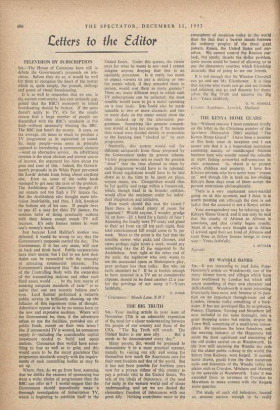.Centers to the Editor
TELEVISION BY SUBSCRIPTION SJR,—The House of Commons have still to debate the Government's proposals on tele- vision. Before they do so, it would be well for them to recognise the heart of the matter which is, quite simply, the pounds, shillings and pence of visual broadcasting.
It is as well to remember that no one, in the current controversy, has ever seriously sug- gested that the BBC's monopoly in sound broadcasting should be broken. If the same doesn't apply to TV, it's for the simple reason that a large number of people are dissatisfied with the BBC's standards in this field—without necessarily blaming the BBC. The BBC just hasn't the money. It costs, on the average, six times as much to produce a TV programme as its equivalent in sound. So, many people—even some in principle opposed to introducing a commercial element —want an alternative service. As advertising revenue is the most obvious and proven source of income, the argument has been about the pros and cons of this. Indeed, the Govern- ment's proposals in its White Paper prevented the Lords' debate from being about anything else. Even so, some of the noble lords managed to get near the crux of the problem. The Archbishop of Canterbury thought £5 per annum not too high a TV licence fee. But the Archbishop also thought more tele- vision inadvisable, and thus, I felt, knocked the bottom out of his case. If people have to pay £5 a year for their TV licence, the noxious habit of doing practically nothing with their leisure except watch TV will increase. It's only human nature to want one's money's worth.
Just because Lord Halifax's motion was defeated, it would be wrong to say that the Government's proposals carried the day. The Government, if it has any sense, will now sit back and think hard. Public corporations have their merits; but I fail to see how their duties can be reconciled with the necessity of ,attracting commercial interests. The Government's statement that " the combining of the Controlling Body with the ownership of the transmitting stations and other such fixed assets would . . . be the best means of ensuring adequate •standards of taste " is so naive that one can scarcely believe one's eyes. Lord Samuel performed a valuable public service in brilliantly showing up the fallacies .of this ingenuous train of thought. Advertisers appear to be by no means keen on the new and expensive medium. Where will the Government be, then, if the advertisers refuse to use the facilities, provided out of public funds, except on their own terms ? No: if commercial TV is wanted, let commerce supply it—including the considerable capital investment needed to build and equip stations. Commerce then would have some- thing to lose as well as to gain; and this would seem to be the surest guarantee that programme standards comply with the require- ments of such controlling bodies as may be set up.
Where, then, do we go from here, assuming that we dislike the excesses of sponsoring but want a wider choice of programmes than the BBC can offer us ? I would, suggest that the Government should immediately make a thorough investigation of Subscription TV, which is beginning to establish itself in the United States. Under this system, the viewer pays for what he wants to see—and I cannot imagine anyone denying that this is an equitable procedure. Is it really too much to expect viewers to pay a shilling or two for events which, if they attended them in person, would cost them as many guineas ? There are many different ways in which such TV subscriptions can be collected; the most sensible would seem to itc a meter operating on a time basis. Sets could also be made tuneable to two or more channels; and two or more dials on the meter would show the time clocked up by the alternative pro- grammes. Something like genuine competi- tion would at long last emerge if the moneys thus raised were divided strictly in proportion to the listening time " clocked up " by each programme.
Naturally, this system would call for different safeguards from those proposed by the Government under its present scheme. Variety programmes are so much the greatest " draw " that the time allotted to them by each programme would have to be rationed; and broad regulations would have to be' laid down as to the time to be spent on plays, serious music, etc. Competition would thus be for quality and range within a framework, which, though fixed in its broader outlines, would allow the maximum outlet for indivi- dual imagination and initiative.
How much should this cost the viewer ? Here there is indeed plenty of room for argument ! Would anyone, I wonder, grudge 3d. an hour—Id. a head for a family of four ? Assuming the family were TV-crazy and glued to their` set from six till ten each night, their total entertainment bill would come to 7s. per week. More to the point is the fact that the sensible viewer who picks and chooses, and views perhaps eight hours a week, would pay something like the £5 fee suggested by the Archbishop. And, right at the other end of the scale, the highbrow who only wants to see the occasional opera or Shakespeare play, pays perhaps less than today. But why on earth shouldn't he ? If he is foolish enough to have invested in a TV set at considerable expense, should he be fined another f2 a year for the privilege of not using it ?—Yours faithfully,


































 Previous page
Previous page